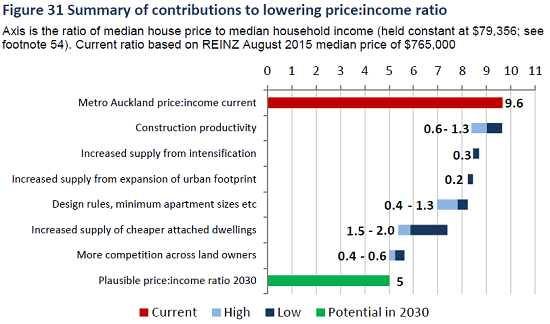
Auckland Council’s chief economist is calling for authorities to make renting more attractive, implement road user charges, relax some building restrictions and shut the NIMBYs (‘not in my back yarders’) up, to help solve Auckland’s housing problems.
In his ‘Housing supply, choice and affordability’ report, Chris Parker has released a bold set of recommendations he believes local and central government should adopt to make Auckland housing more affordable.
He notes the median house price in metropolitan Auckland is about 10 times greater than the median household income (ratio of 10:1).
While this should ideally not exceed a ratio of 3:1, Parker says it’s realistic to aim for reduction in the ratio that would see prices exceed incomes by just five-fold by 2030 (ratio of 5:1).
"This would be achieved primarily by reducing costs to deliver housing and increasing the scale and breadth of housing options (including attached dwellings) for the bottom half of the market," Parker says.
"Compounding income increases over time will assist too. Note that such a target does not mean trying to sharply reduce people’s wealth; intensification can potentially allow for land values to actually increase at the same time that house prices decrease."
Parker provided the below graphic representation of the elements that would contribute to the lowering of the ratio.

This is what he recommends local and central governments do to achieve this goal:
Increase land for development
- Increase greenfield land supply, enabling more rural subdivisions.
- Permit more intensification in the Unitary Plan, targeting the inner-city suburbs the NIMBYs are trying to keep their villas on.
Infrastructure and services: funding, financing and planning
- Enable ratepayers to profit from economic activity in their region. Parker suggests local and central governments work together, so that some of the tax take from increased regional economic growth may be returned to ratepayers for example. OECD and Productivity Commission research backs up this idea that could incentivise growth, help fund infrastructure, lower rates, and mitigate opposition to expansion and intensification
- Target rates to fund infrastructure growth through the Council expanding its beneficiary pays approach. Parker says this is a more robust and appropriate way to incentivise development than a land tax.
- Charge users of roads a higher fee if travelling during congested periods to curtail excessive use. Parker says the existing transport network can cope with the transport demands from more land supplied for housing if it is managed more efficiently through pricing.
Make design and construction easier
- Get rid of any design requirements in plans that relate to the interior functioning of homes, and rely on the Building Act to regulate for safe healthy homes. These include things like lighting, minimum dwelling sizes, floor to ceiling heights, outdoor space, sustainability requirements. Parker suggests the Council work with the Government to instead focus on managing external impacts like stormwater runoff and water quality.
Residential construction productivity and supply
- Revamp the structure of the building sector, so productivity increases by 25% by 2030. Parker believes this is doable, and will reduce the cost to construct an average 200m2 house to about $300,000, down from about $400,000. He says there’s been little if any measured productivity growth in the residential construction sector for over 25 years. Watch this interview with Auckland Council's building control manager for more on this.
- Replace ‘joint and several liability’ (JSL) with ‘proportionate liability’. Parker explains: “NZ has a policy of using JSL to distribute liability among multiple defendants who are found to have caused the same damage. This means that if two or more people are found to have caused the same damage, each defendant can be obliged to pay up to the full amount of the loss suffered by the plaintiff. The option is to move to proportionate liability, whereby each defendant is liable for no more than their relative share of fault.” The Productivity Commission says JSL is partly to blame to poor performance in the building industry, as it encourages builders and regulators to be excessively risk averse when it comes to innovation in design, materials and construction techniques.
Make renting more attractive
- Amend the Tenancy Act to provide more favourable terms for renters. These could include longer notice periods for both landlords and renters, and the requirement for landlords to give tenants good reason when giving them notice. Parker supports Shamubeel and Selena Eaqub’s reasoning that it’s important to make renting a better option for the increasing large portion of society that can’t afford to buy – Generation Rent.
22 Comments
The only bold recommendation (implied) is that the dominant faction of the Auckland Council would have to admit that they have been wrong, wrong, wrong for the last x years.
These recommendations are completely orthodox and have been articulated all over NZ (especially in this august publication) for the last three or four years.
Good on Parker for ignoring Hulse/Brown and taking a steady middle line; it's just a shame that his 5.0 multiple median target is so insipid. Can't have everything.
To be fair a lot of the time and requirements are mandated by the government (building code). The council have to tick all those stupid boxes so they can not be held liable if the building fails. If the government diluted the building act for simple residential builds and removed all council responsibility then things would be much quicker.
We went through all the consent processes 1 year ago, another place, another city, a long way south of Auckland, having followed all the comments and articles here on interest.co.nz, the bleating of the super city council, the ripostes from central government , complaints about long delays from applicants - was expecting a long drawn out battle. Surprise, surprise, it was all done and dusted in less than 8 weeks which included xmas plus having to seek coastal preservation approval. Only complaint we had was the drip feed nature of it, each step was not revealed until the previous one was completed
I don't think its that hard in Auckland either unless you want to do something that requires resource consent. But the fact you have to submit full plans (requiring an architect, engineer, etc) and then have 10 or more inspections at various stages of a project (requiring good project management and some down time) adds a stupid amount of money to a simple project (e.g. a carport) and all up adds a fair amount to a complete build too. The fact you have to use BRANDs approved materials adds a significant cost to the materials.
The process I went through in the late 90's in Rodney was bad enough, I thought that at the time anyway. It would blow minds what I actually got done then, which was a unique structural system of my own design. Knocked up my own rudimentary plans on autocad and away I went. I even did my own producer statement for a septic tank of my own design.
I don't know i could be bothered jumping hoops through the current system, so next I time i will just use my skills to design around the process.
Few years ago I applied to Auckland council for a very small modification inside of our house. I came in four times and got four totally different answers and four lots of fees. Just by chance, I discovered that Auckland Council destroyed our property file back in the early 1990s... Whoala.. you know the ending to that story!
Why pick the 5 x multiple and why by 2030?
These made up targets and the fact that he allocates so little to urban expansion shows that what urban expansion he is talking about will only be added through slow release of restrictive growth boundaries which really means that any reduction in the medium multiple will only be achieved by an even greater reduction in house size, ie house will be smaller but $ per m2 will be greater.
Savings by increased construction prodcutivity will mean nothing without unrestrictive land supply as any savings will be cannibalised by those in the front of the land process queue ie the council and the land bankers and will never be passed onto the end homeowner purchaser.
And not one mention of council fees being reduced if some of the processes are removed eg internal requirements, but plenty of other revenue generating options like Tranport tax.
Councils implementation of these solutions will NOT result in truly affordable housing, partly because of what is recommended, but mainly because it would be council doing it.
Having recently just brushed against the Auckland Council for a small, meaningless consent, I've been left wondering. Apart from the absolute rudeness and demanding attitude of the council employee and the jargon which required me to hire an engineer at real cost, there were interminable delays. A simple process was protracted and costly and needlessly stressful. Maybe some aspects were required by government requirements but that's only more reason for the entire system to be overhauled.
Very little measured productivity for the last 25 years takes us back to The Building Act 1991....no surprises here.
And around this period there was a recommendation put out by Treasury in regards to the potential of the building industry to be tapped to increase GDP....now I have searched for this document but due to them spewing out so much stuff I haven't been able to find it...I am sure I have previously post it here in interest.....but will keep searching as it is important in understanding how this issue is systemic.
I'm thinking some incentives are in order.....seriously Councils should be fined for tying up land from being developed or used..
How about if I can't build what I want on my land then the Council has to pay me for my losses!!
Councils need to get back to the basics.....if you cannot do the basics properly how the heck do you expect to do the finer things? People need to get off the density wagon.....many people want some space and a different standard of living than what Council is willing to allow.....it is not up to the Council to dictate how people should live.!!!
Simple answers to a complex prob I know, I know. But here it is.
Place modest size, single storey, light roof residences under Schedule 1, BA 2004. Consent exempt. Keep requirements for foundation design. Drop producer statements - they are quite irrelevant to long-term performance.


We welcome your comments below. If you are not already registered, please register to comment.
Remember we welcome robust, respectful and insightful debate. We don't welcome abusive or defamatory comments and will de-register those repeatedly making such comments. Our current comment policy is here.